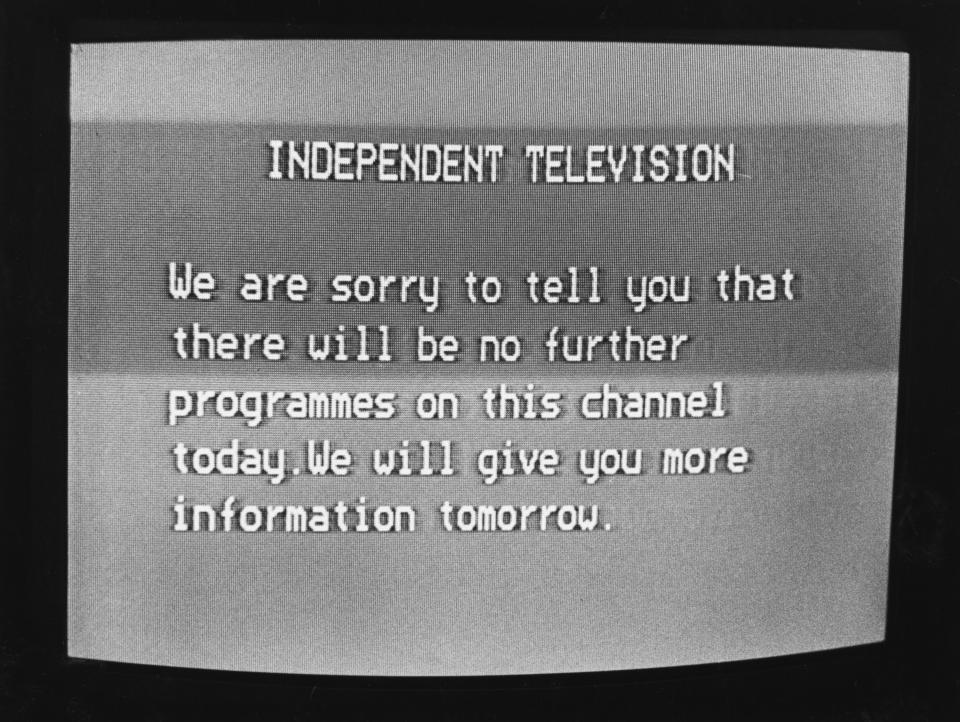Union Talks Hit Britain: How Equity & Pact’s 2024 Negotiation May Play Out As Strike Action Looms Large

The ink has dried on SAG-AFTRA’s deal with the AMPTP but, in the UK negotiations between union and producer will soon kick off, and the threat of strike action looms large for the first time this generation.
While the British system works very differently to its cousin on the other side of the pond, this year will see new contracts for actors negotiated between British Equity and producer trade body Pact that will govern the vast majority of UK TV series and indie films. Equity also needs to strike separate deals with the BBC and ITV, and ‘side letter’ deals with the streamers. It’s going to be a big 12 months.
More from Deadline
Led by General Secretary Paul Fleming, Equity is in the process of crowdsourcing demands from its members to take to the negotiating table, with the Pact tête-à-tête set to begin in earnest in a few months. Equity sent out potential negotiation dates several days ago and is looking to sit down around Easter.
Speaking to Deadline, Fleming says bringing home a set of good deals come next Christmas is the 40,000-member union’s number one priority for 2024, and his team has high hopes.
Equity and Pact will negotiate three broad agreements: One covering TV and streaming, another for movies and a third for supporting artists. Indies commit to the agreements when setting up a project and actors who feature do not have to be Equity members. Away from Pact, Equity is negotiating with the BBC and ITV over deals that mainly apply to soaps, with the ITV talks currently the furthest along.
The approach to the agreements differs with the U.S. broadly because they are constantly being updated and tinkered with, rather than reaching a cliff-edge that, as the industry discovered to its detriment last year, often precedes a strike. A good result for either party is therefore unlikely to be delivered with the same fanfare as it was in the States, and both may be keen to prevent negotiations from spilling out into the open as they did between Pact and below-the-line union Bectu in 2022.
What could be on the table?

Equity is seeking updates to the TV and film deals in the immediate future and this will form the brunt of the negotiations, with demands set to be finalized over the coming months before the union takes its shopping list to Pact, which represents hundreds of UK production outfits.
Improvements on the current deals in areas including basic pay (an increase of 7% for 2024, 3.5% for 2025 and 3% for 2026 has already been agreed on the TV side), pensions, healthcare, sick pay, maternity provisions and those all-important secondary payments – effectively residuals – will all be under discussion when the union strides toward the negotiating table. “Secondary payments alone nearly hit £15M ($18.9M) last year [from producers to actors] and we want to beat that in 2024,” Fleming tells Deadline, with a brimming confidence in his voice.
Unsurprisingly, the hot-button topic of AI is also under discussion. Equity has led the way in AI research in areas such as synthesization – the potential for actors’ faces to be cloned and used in other shows – and the union made public a template AI contract to protect artists engaging with performance cloning work in the middle of last year.
Deadline revealed in September that AI provisions are taking up much of the airtime in the current Equity-ITV negotiations and were this deal to be struck before Pact, it would be the first of its kind to contain such provisions.
Pact is understood to be receptive to Equity’s AI push.
“What we are seeing from the agent community is that they themselves try to insert wording around AI into actors’ agreements and that just doesn’t work,” says a producer source who will be involved with the negotiations. “Language is required in contracts in the future so that the agent knows if a performance is taken and used in something else then there has to be consent and payment.”
The source stresses that “most producers I speak with don’t want to create synthetic actors but want artistic performance. With AI you have to keep a watching brief on how the technology develops. We would be happy to do that in conjunction with Equity.”
Elsewhere, and with more of a long-term hat on, Equity bosses are keen to enact a plan that would combine the TV and film agreements in line with the U.S. system, allowing actors who star in indie movies to take advantage of the improved TV royalties system when their projects appear on streaming services.
Fleming points out that the SAG-AFTRA agreements apply to both TV and movies and that barriers between the two mediums have broken down in recent years. He believes this is one of the biggest issues for his members and, as with AI, Pact is understood to be receptive.
“Getting a model that works for all media is a good thing,” says the producer source. “Our indie film sector is in a terrible mess, so we need to aim for a model that allows iconic British films to be made.” Sources say that bringing together the agreements is a longer-term aim and is extremely unlikely to complete by the end of 2024.
Streamer side deals

Separating the 2023 SAG-AFTRA action and previous U.S. actor strikes was the role of the streamers, which became a large sticking point. These digital giants have a major presence in the UK and pose similar problems.
For the past decade, Netflix, Sky, Disney and Apple have approached Equity negotiations in the form of ‘side letters,’ which effectively takes the deal with Pact and adds a small premium for their original commissions. Deadline understands Netflix’s deal adds a circa-25% pay premium on top of Pact’s deal, for example, although each ‘side letter’ is tailored to the relevant player’s subscriber model and is complex.
Nevertheless, the ‘side letters’ remove the need for the streamers and Sky to enter intricate, months-long negotiations with Equity. It remains to be seen whether they will once again piggyback off the Pact deal with a premium once it is struck, bearing in mind that a good result for Equity will inflate the terms on each ‘side letter’. If the deal leads to a significant uplift in terms, U.S. players may feel they have no choice but to jet over to the UK to sit down with Fleming and co. Netflix, which struck the first ‘side letter’ deal a decade ago, declined comment, as did Apple, Disney and Sky. Other streamers such as Amazon’s Prime Video and Paramount still use the Equity Pact deal.
“Before the SAG strike, [the streamers] were very hands off [in UK negotiations],” adds Fleming. “Pact is the dominant voice for British producers, but the bulk of money is American money, so the question now is whether they are willing to be more hands on in a negotiation.”
Heading for a strike?

Where these negotiations are concerned, the question on everyone’s lips is whether Equity will take matters into its own hands in a very different way and – like its American counterparts – call a strike.
Any action would be the first of its kind in the UK industry since 1997, when Equity members refused to record voiceovers or appear in commercials in the run up to Christmas over pay and – surprise, surprise – compensation. In the heady labor days of yesteryear, the 1970 ‘Colour Strike’ saw ITV go almost completely black for a colossal three months due to Equity action, and mini versions of this happened several times through that decade.
However, mostly due to Prime Minister Margaret Thatcher vehement stance against striking in the 1980s, labor laws have toughened considerably in the UK and finding a critical mass of Equity members will not be straight forward.
For starters, Fleming explains that only members who are working at the time of potential strike action can be balloted, rather than the entire base, making it harder to reach that all-important majority. More than 50% of members have to vote ‘yes,’ while the strike cannot go ahead if less than half turn up for the ballot. In 2022, Pact’s negotiation with below-the-line union Bectu dragged on for months and regularly spilled out into the open, and yet that union never threatened a ballot.
Nevertheless, Fleming says: “I don’t believe it’s our purpose to operate as a trade union if we don’t have the mechanism to take industrial action,” pointing out that there are other potential levers such as instructing members not to take work on certain projects. “Can we take industrial action? Yes,” he says. “Will it look like America? Certainly not.”
So while UK newspaper front pages have been bedecked of late with stories of striking nurses, doctors, train workers and teachers, the shape of Equity’s action would be immeasurably different to the States were it to go ahead.
Pact, for what it’s worth, has publicly poured cold water on the notion of a strike, with CEO John McVay last year branding any action “really bad for the most poorly-paid people,” as he sought to draw a line between labor laws in the UK and U.S.
McVay also took umbrage with the notion that Pact is simply a U.S. version of the AMPTP, declaring: “None of my members are Disney or Warner Bros. Discovery.”
How much Fleming and his colleagues want to follow the lead of their American counterparts will be key to all this. Fleming has spent much of his time in the past year in the U.S., speaking to SAG reps at least weekly during the strike and becoming close with chief negotiator Duncan Crabtree-Ireland. McVay, on the other hand, detailed his attitude by dismissively saying, “What happens in America is what happens in America” when challenged on this last year.
Whether the pair can meet in the middle will be key to just how disruptive these negotiations are for the UK industry in 2024.
Best of Deadline
2024 Premiere Dates For New & Returning Series On Broadcast, Cable & Streaming
2024 Awards Season Calendar - Dates For Oscars, Emmys, Grammys, Tonys, Guilds & More
Step & Repeat Gallery: The Best Red Carpet & Party Photos Of 2024
Sign up for Deadline's Newsletter. For the latest news, follow us on Facebook, Twitter, and Instagram.


